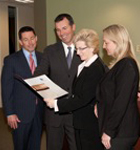
Working at Dole Food Company, Inc. just made sense to Michael Carter. He started his legal career with a law firm on Wall Street, and later worked for several companies as general counsel until landing at Dole in 2000. Carter is now executive vice president, general counsel, and corporate secretary of one of the most recognized brands for fresh and packaged produce in the United States. Here, Carter describes leaving the life of a “transaction junkie,” the exhilarating rewards of going in-house, and defending his company in a way that makes it stronger and more resilient.
On Wall Street, everything was very transaction oriented. You pull off a fantastic transaction, there’s an adrenaline high, the closing’s done, and then you move on to the next deal. What’s missing is continuity. Especially if you’re business oriented, there’s a feeling that you don’t see any continuity to your work. For me, that got to be old.
I’m a businessman who happens to be a lawyer. What caused me to go in-house was that I could use the skills I got on Wall Street from an extraordinary law firm, but use them in a business context where you can see the results of what you’ve done. You’re held accountable more directly. You can be a part of it. You’re not there as a hired gun, which is the way it is with a Wall Street law firm. It’s a different approach, but it’s exhilarating, so much so that I’ve never looked back.
Dole is the third public company I’ve been general counsel of, and I’ve been with five companies. Dole was public at the time I came, but we took it private in 2003, and then public again in 2009. I had a key leadership role in the going public and private transactions, absolutely, but I think here, the key for me would be my operating role. I’ve defended this company successfully in major litigation brought by opportunistic plaintiff lawyers, where we were successful in showing that they had made fraudulent claims. We have positioned the company in a way where we could short-circuit—if not avoid—future litigation battles, deploying what I call “kill steps.”
We have an outstanding legal function at Dole. No general counsel pulls this off on his own. The general counsel brings together the right people and then gets out of their way: You’ve got people with the kind of judgment and skill set that you need. You give them the right goals, and they go off and do that. When you set it up that way, you position the organization in a way that it’s knowledgeable in its decision making, and in its implementation of those decisions. You keep avoidance in mind, not in terms of being risk averse, but in terms of your awareness of potential pitfalls, so you can minimize some of your litigation risk.
Part of being an effective business lawyer is dealing with litigation in a way that doesn’t encourage more of it. You can approach it with a view of settling. We take the opposite view, wherein we take actions that not only beat the plaintiffs, but discourage future claims. If the company has done something wrong, you deal with it. But the good news is that I’m rarely in that position.
At Dole, we have a chairman who believes that anything is possible, but who also is a straight arrow. He’s looking for creative, innovative thinkers. It’s an extraordinarily competitive environment the company’s in, highly regulated with lots of pitfalls. It’s easy for a company to be minimized by a competitive environment like that. But the message from the top is to not do anything that gives you a short-term achievement at a long-term risk, but also to be agile and creative. Otherwise, you won’t differentiate yourself from competitors. You have to have a mixture of creativity, energy, and judgment.

